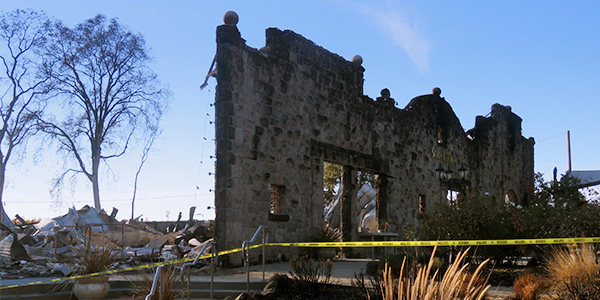By Hudson Sangree
Pacific Gas and Electric announced late Friday it had reached a $13.5 billion settlement with the individual victims of wildfires sparked by its equipment from 2015 to 2018.
The announcement ended a tumultuous week for PG&E that included a growing movement to take the investor-owned utility public and revelations in a state report that said worn and broken hardware on a century-old transmission line had led to California’s worst wildfire disaster.
PG&E’s agreement with the Tort Claimants Committee (TCC) and firms representing individual claimants, to be paid in cash and stock, matches a proposed deal by bondholders for their own Chapter 11 reorganization plan in an effort to take over the utility. PG&E and bondholders have engaged in mediation and negotiations with California Gov. Gavin Newsom to resolve their differences. (See PG&E Bankruptcy Judge Appoints Mediator.)
How PG&E’s announcement will affect the bondholders’ plan remains uncertain, but the utility hailed its settlement as a big step in its bankruptcy. The company is trying to emerge from bankruptcy by June so it can participate in a $21 billion wildfire recovery fund established by the state last summer under Assembly Bill 1054.
“From the beginning of the Chapter 11 process, getting wildfire victims fairly compensated, especially the individuals, has been our primary goal,” PG&E CEO Bill Johnson said in a statement. “With this important milestone now accomplished, we are focused on emerging from Chapter 11 as the utility of the future that our customers and communities expect and deserve.”
Neither the TCC nor other interested parties had issued any reaction to the announcement as of Sunday.
PG&E came under heavy criticism this fall for cutting power to millions of residents as part of its public safety power shutoff events, intended to prevent its equipment from igniting more wind-driven wildfires.
The $13.5 billion settlement with the TCC, composed of the lawyers representing fire victims, will resolve all claims arising from 22 major wildfires in Northern California’s wine country in October 2017 and the 2018 Camp Fire, PG&E said.
In a surprising move, the agreement includes the Tubbs Fire, which killed 22 people and leveled part of Santa Rosa in Sonoma County in October 2017. It’s unclear why that fire was included. State fire investigators determined a private landowner’s illegal distribution lines, not PG&E’s equipment, sparked that fire. PG&E has denied responsibility. A trial to determine liability is scheduled to start in January, but whether it will proceed is unknown.
The settlement also covers the Butte Fire, which decimated communities in the Sierra Nevada foothills southeast of Sacramento in September 2016, killing two people, destroying 475 homes and scorching more than 70,000 acres. Many victims of that fire have yet to receive compensation from PG&E.
The settlement with fire victims is the third and final agreement that PG&E wanted to emerge from Chapter 11 reorganization. The utility previously announced a $1 billion settlement with local governments over fire claims and an $11 billion settlement with insurers and hedge funds who hold subrogation claims against it.
On Wednesday, lawyers argued in court over whether the bankrupt utility should be allowed to move forward with a proposed $11 billion settlement with the subrogation claimants. Lawyers for fire victims have argued that the deal would leave the company without enough resources to fairly compensate fire victims. (See related story, PG&E Judge Weighs Insurers’ Settlement.) PG&E’s agreement with fire victims could potentially moot that concern.
All the settlements must be approved by U.S. Bankruptcy Judge Dennis Montali in San Francisco, who is overseeing the case.
PG&E’s stock price shot up from $7.66/share on Dec. 3 to $10.49 during trading Thursday based on rumors of the settlement with wildfire victims prior to its announcement. Shares closed Friday at $9.65.
The settlement ended an eventful week in the PG&E drama. California’s largest utility, facing billions of dollars in wildfire liabilities, is engaged in one of the largest bankruptcies in U.S. history.
On Dec. 3, the California Public Utilities Commission’s Safety and Enforcement Division released a nearly 700-page report that detailed PG&E’s failings in its inspections and maintenance on its 100-year-old Caribou-Palermo transmission line in the rugged foothills of Butte County. Those failings led to the Camp Fire, the deadliest and most destructive fire in state history, which killed 86 people and destroyed more than 19,000 structures in November 2018 in the town of Paradise, state fire investigators and the CPUC found.
On Thursday, San Jose Mayor Sam Liccardo said his plan to turn PG&E into a public utility was gaining ground — with 115 elected officials now supporting it — as he released an outline of principles meant to guide such a transition. Those principles include keeping the giant utility whole, instead of breaking off pieces into municipal utilities as some have suggested, while transitioning it to public ownership and operation. “Today, we released a … framework for a customer-owned PG&E that is transparent, accountable and equitable to put the company’s days of underinvestment, mismanagement and negligence far behind us,” Liccardo tweeted.





